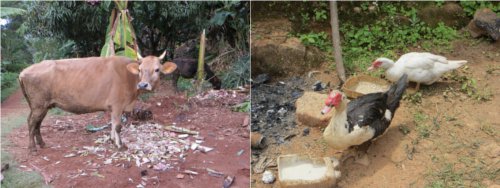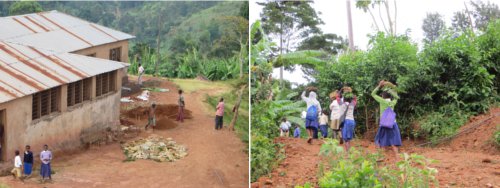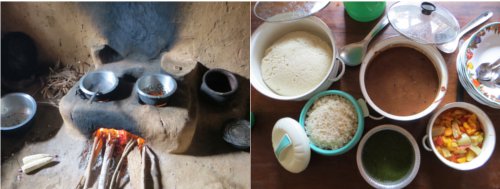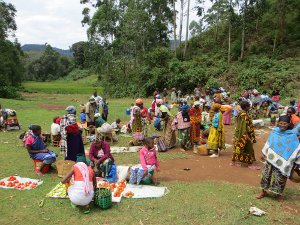WWOOFing in Entenga, Kilimanjaro Province

We arrived to Gonja Mwala Organic Farm in Entenga Village on February 6, 2014 and enjoyed 8 wonderful days of WWOOFing and living with the Mngulu family. The farm is situated at an elevation of about 2,000 meters (6,562 ft) above sea level within the Pare Mountains of the Kilimanjaro Province, south of the town of Same. This beautiful family farm located on a hill offers a pleasant climate and a community to get in touch with Tanzania’s agriculture and culture. The land has belonged to the Mngulu family for many generations. We felt extremely privileged to be welcomed by Thaddey Serafin Mngulu, also known as Babu (Grandfather), owner of the farm, and to share the WWOOFing experience with his children Serafin, Rosie, and Peter, as well as Gust another WWOOFer from France.
The farm is currently growing plantains, bananas, corn, passion fruit, pineapples, apples, carrots, avocados, tomatoes, parsley, chili, and has bees, cows, ducks, and geese. During our days there, we had the opportunity to help in different projects: leveling a pathway, digging a hole for a biogas tank, planning the expansion of a water dam for the village, harvesting vegetables, and preparing the soil for planting. Peter and Serafin worked hand-in-hand with us in developing most of these tasks. They are both great leaders and their dedication to help their father in the farm inspired us.

We felt honored to be called rafiki (Friend) by both of them. Serafin communicates and coordinates with WWOOFers to volunteer on the farm. He is very committed to allocate the funding and promote interesting projects in the farm and the community. During our visit, he was supervising the repairing process of seven classrooms located next to the farm. The school was built in 1948 on the land of Babu’s father by Catholic missionaries, and it allowed 300 children to receive an education. The classrooms have faced damage over time due to strong rains. The current repairs are possible thanks to the advocacy of Serafin and the donations made by former WWOOFers from Switzerland. We witnessed the way in which even the children became involved in the repairing process of the classrooms by helping to carry, on their heads, the stones needed for the construction. Another community project that Serafin is trying to start is the expansion of a water dam for the village. Unfortunately, the gold rush and current explorations of this metal are polluting the rivers around Entenga, so it is vital for the community to protect their natural sources of water. We visited the site and Sal made a preliminary design for the construction. Sal and Serafin reviewed the design to determine the amount of materials needed. Serafin is hoping that this proposal could be presented to ASHKO, an organization from United States that assists and finances community projects.



The building of a biogas tank is another great initiative promoted by Serafin. With the technical support of the Tanzania Domestic Biogas Program and the donations from friends, the family decided to begin this project in their farm. The biogas will use cow manure to produce methane gas as an energy source for cooking and electricity, as well as compost for crops. The main goal of incorporating this biogas system is to make things easier for Babu to cook for himself when he is alone. The building of the biogas tank is a big investment with an estimated cost of $900 US dollars. However, the hope is that with time the use of biogas will reduce their expenses on electricity, protect the environment, and protect their health by eliminating the use of firewood. The family also hopes that the incorporation of this green energy model could inspire other families to do the same. We were at the farm during the beginning stages of this project and our job was to dig a hole to a depth of 1.75 meters in order to be able construct the biogas tank. The task demanded the continuous work of five men and one woman for three days. Digging was strenuous and challenging, especially when we encountered banana tree roots, but the excitement of helping Babu kept all of us going until the hole was successfully completed. Now the building process can begin!

During our stay we learned a lot about organic farming, but the most valuable aspect of this WWOOFing experience was to be part of the daily life of the Mnugulu family. All family members made us feel welcomed and they even tried to teach us words in Swahili and Pare, their native languages. We spend a lot of time with Babu and Rosie, their kindness stole our hearts. Rosie was in charge of the cooking and we loved helping her in the kitchen. She was always laughing with us and teaching us how to make traditional meals.
She showed us how to cook ugali (cooked maize flour), ginger tea, dik-dik stew (small regional antelope), mdazi (fried sweet bread), and juice from the baobab fruit tree. She surprised us with a delicious wheat bread made on the fire, thought us how to peal plantains with a wood stick, and clean our hands with jasmine leaves. When Rosie discovered that Sal is an engineer, she was so proud of him that she decided to keep calling him Mr. Engineer. Since the beginning, Rosie called Gisela dada (Sister) and appreciated the help we both offered in the kitchen. One evening after preparing dinner together, Rosie suggested Gisela to tell Babu, “Babu karibu chakula” (grandfather welcome to the food) after serving the table. Babu, Serafin, and Peter were surprised to hear Gisela speaking Swahili and the three of them celebrated the statement with laughs of enjoyment. Sal also learned to say, “chakula kitamu sana” (the food is very delicious), the family was pleased to hear it and admired our efforts to learn their language.
While cooking with Rosie, she shared with us her plans of going into nursing school. She is an intelligent and hard working woman, we feel so excited about her professional goals because she has the compassion and dedication needed to help others. On another night, while Gisela was helping Rosie in the kitchen, Rosie gave her a kenga (colorful skirt that is wrapped around the waist) to put on, what many women in Africa traditionally wear, and explained that it will protect her legs from the fire. Gisela was touched by Rosie’s meaningful gesture, as it symbolize to her a welcoming into the African culture. When Gisela thanked Rosie for it, she replied: “You are Mama Africa.” Gisela treasured Rosie’s work and enjoyed spending time helping her around the kitchen. On one of those occasions Babu told Gisela: “You are not Mzungu (white person), you are African.”

Our WWOOFing experience also gave us the chance to develop a relationship with Babu. He is 76 years old and got married on June 1, 1960, but his wife passed away almost 7 years ago on May 2007. With tears in his eyes, Babu told us that now he has to live alone. Babu does not know his own birthday, but his wedding day and wife could never be erased from his mind. Together they had 7 children and all of them live away. Serafin is the eldest and lives in Moshi with his wife and children. He comes to stay with Babu at the farm every time WWOOFers are visiting. Babu’s son, Peter, is the only one that stayed living in the village and lives the closest to Babu in another farm with his wife and children. More recently Babu’s daughter, Rosie, came from Morogoro to stay with Babu for two months to help out. His other four children, two men and two women, are a Catholic priest, a soldier, a nun, and a teacher. Babu explained that every May 13 all his children come back home to attend a mass in honor of his wife. Babu expressed feeling happy every time WWOOFers come to visit him because he enjoys their companionship around the house and feels lonely when his new friends have to leave. He told us he wishes we could stay in Africa for at least 3 months, but understood we needed to continue on our trip. We talked about taking a safari (voyage) together and he agreed to go on a journey with us if we return to visit him next year, he said he needed some time to improve his English. Babu shared with us his dream of visiting Washington D.C. to meet President Obama and then continue on to New York, and Canada, where he has a friend. We added El Salvador and Colombia to the trip to visit our home countries. Babu was always open to talk with us about his thoughts and feelings. It was thanks to his English skills and willingness to share time with us that we were able to build a relationship. One morning during breakfast we were having a conversation and he asked us: “How is it that we know what we could eat? How is it that our brain knows that a plant like cassava is good for eating?” We were intrigued by his questions as they were linked to our ponderings at one time, but we regret not being able to speak his native languages to communicate more in depth with him.

Babu allowed us to explore and become connected with his community. On a Saturday morning Babu took us to a local market and we were pleased to see him talking with many of his friends and relatives from the area. He introduced us to a woman saying: “She is my sister. My dad and her mom came from the same stomach.” We realized that every relative is referred to as a sister or brother, regardless if they are cousins. The outdoor market was small and colorful. We were the only foreigners and the people seem happy to have us there. Sunday was our rest day and we joined Babu for the morning mass at the local Catholic Church.
Babu and Peter are active members of the choir, we were excited to see them singing and dancing with joy during the entire ceremony. The mass in Entenga Village feels like a real celebration with African taste! During the mass, Sal helped carry a little girl that was sleeping while her mother went to take communion. While asleep, the girl urinated on herself and on Sal and when the mother realized, she couldn’t stop apologizing. Sal reassured the mother that it was not a big deal and everybody said that it was a baraka (blessing). After mass, the incident became the reason of many laughs among us. As we walked to return to the farm, we ran into many locals who knew and appreciated Babu: a nun invited us to have tea, bread, and avocado at her home; and as we continued walking one of Babu’s friend greeted him and invited us to drink a beer with their group of friends at a local bar. The closeness and friendly spirit of the people in the village fascinated us. Everybody knew each other and we could feel at home despite the distance. We were embraced by the community, from young to old, everyone welcomed us. We had experienced the same feeling one afternoon when we were washing our clothes and a small girl spontaneously started helping us. The sense of a whole is greater than the individual, and you can truly feel connected to others. When we told Babu how nice it feels to see how people love him, he told us a powerful truth: “You must love everyone so they can love you too.” That Sunday we did not return home until after 2pm, the entire experience was fun and memorable, everybody loves Babu!
During our last day in the farm, Gisela went to work with Babu. They spent the morning weeding and talking about the medicinal properties of some herbs. Babu showed Gisela a plant that in combination with others is used to treat malaria and he also thought her that the clover plant can be used to heal broken bones. As they were working, Babu asked Gisela questions about Colombia: “Do the farmers in Colombia use big machines or hoes to dig the soil? What religions people practice in Colombia?” Gisela explained that many farmers in Colombia use hoes like Babu and the majority of people in her country practice Catholicism. As their conversation developed, Gisela talked to Babu about how she had been traveling around the world mostly by bus, train, and boat for the past 16 months. Babu said: “I wish to go to Colombia. When you and Mr. Engineer come back, I wish to go with you, but I wish to go on a plane.” Babu’s genuine desire to travel was bitter sweet. We felt honored by his wish to go on a safari with us and feel guilty for being part of the world economic injustice that deprives a great majority of the population the opportunities to materialize their dreams…
Our last night in Entenga was lit by an almost full, but very bright moon. We went to rest with the sad certainty that our departure was closer and a huge desire of stopping time. The Mngulu family has brought so much happiness into our lives, how could we leave them without feeling torn and tearful? We wanted to take Babu with us, make his dream real, giving him the joy as he has done to us. The meaning of our trip continues growing and the list of things to do after the journey is getting longer with each destination. We shall return to Tanzania, Babu and our Mngulu family are waiting for us!
